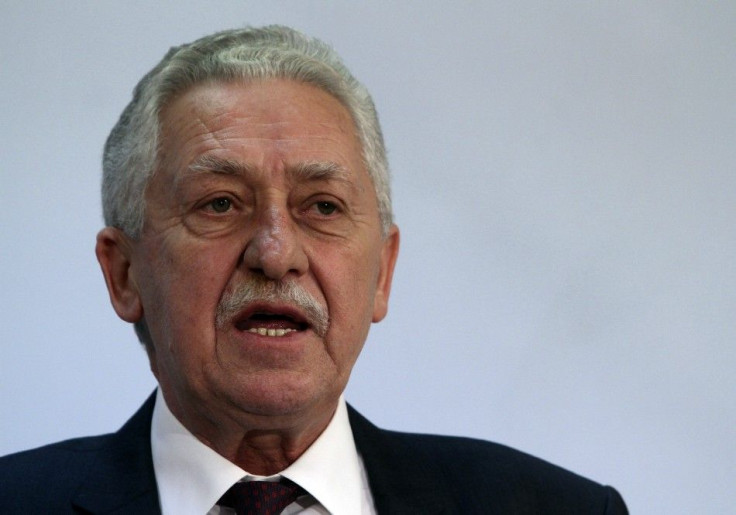Moderate Left Refuses To Endorse Austerity, Pushing Greece Closer To Euro Exit

The political stalemate in Greece worsened over the weekend when the leader of a moderate leftist party refused to join any pro-bailout coalition government, further raising the likelihood of new elections as well as Greece’s inevitable exit from the euro zone.
Investors are apparently pricing in Greece’s departure from the euro zone bloc -- European stock markets are plunging in Monday trading, while the euro fell to a four-month low and European bond yields climbed.
The leader of the moderate Democratic Left party, Fotis Kouvelis, hammered another nail in to Greece's coffin by asserting his refusal to join any coalition that supported austerity, and which did not include the anti-bailout Coalition of the Radical Left (Syriza) party as a member.
No unity government can emerge, Kouvelis told Greek television.
A government without Syriza would not have the necessary popular and parliamentary backing.”
He added: “I am sorry, but each political party must assume its responsibilities, and we have assumed ours,” he said.
On Sunday, Alexis Tsipras, the chief of Syriza, which gained the second most number of votes in last weekend’s parliamentary elections, again reiterated his refusal to support any new coalition government that would abide by the strict austerity measures demanded of Athens by the European Union in exchange for huge bailouts totaling €240 billion ($308 billion).
Greek president Karolos Papoulias tried in vain to get the various party leaders to reach a consensus. The head of the Socialist Pasok party, Evangelos Venizelos, the most prominent advocate of austerity and bailout, failed to form a unity government, following on the heels of similar earlier failures by Tsipras and Antonis Samaras, the head of the conservative New Democracy (ND) party.
Tsipras also criticized Pasok and ND -- which formed an uneasy coalition in the outgoing government -- for agreeing to bailout loans in the first place.
“[We will] not be complicit in their crimes,” he said.
“Those that governed the past two years have not only failed to accept the message from the elections. They continue their policy of blackmail. We call on all Greeks, not just leftists, to condemn once and for all the forces of the past.”
Samaras and Venizelos, both of whom endorse tough cuts to reduce the country’s huge mountain of debt, do not have anywhere near enough combined support in parliament to form a coalition on their own.
“I made every effort to contribute to forming a unity government, but Syriza does not want to heed the popular mandate,” Samaras complained on Sunday.
Even if a new election is called, polls show that Syriza (the most virulent opponent of austerity) would come out on top – a development which would edge Greece closer to default.
Stelios Kouloglou, a Greek journalist, told the New York Times: “I think chances are very low for a [new] government to be formed, taking into consideration the different positions the protagonists have taken.”
Others hold out some hope, since the political party leaders will again meet with Papoulias on Monday.
Mark Lowen, a BBC correspondent in Athens, wrote: “There is still a very slim possibility that there could be success… Kouvelis has said he will still go to the talks [Monday] evening at the presidential palace with the two other big parties. So that will really be the final throw of the dice.”
Lowen added: “If at the 59th minute of the 11th hour [Kouvelis] says ‘Yes,’ Greece will be able to cobble together some kind of albeit very shaky coalition. If he says ‘No,’ this country will take a leap into the darkness, and face fresh elections within four weeks.”
Ben May, an economist at Capital Economics in London, sayd the likelihood of new elections means Greece's exit from the euro zone becomes more of a certainty.
The failure of the major parties in Greece to agree to form a coalition now makes another general election next month the most likely outcome, he wrote.
Even if the pro bail-out parties were to win that election -- which seems probable -- tensions within a new coalition could quickly mount, eventually resulting in the collapse of the Government. And if the anti bail-out parties were to prevail, we think it could result in Greece leaving EMU sooner rather than later.
Meanwhile, worried finance ministers from the euro zone are scheduled to meet in Brussels on Monday to again discuss the seemingly intractable Greek financial crisis and, now, the political deadlock. Euro zone officials, particularly Germany, have already warned Greece it must abide by austerity or face the end of continued financing and expulsion from the euro zone (a scenario that EU officials reportedly do not want).
The EU has already withheld €1 billion, of a €5.2 billion loan, as punishment for Athens dragging its heels on forming a new government.
© Copyright IBTimes 2024. All rights reserved.











